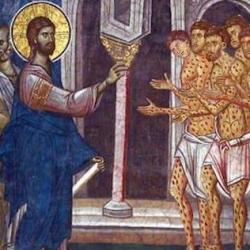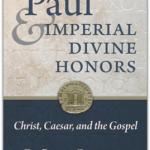Socrates’s discussion of purity in the Sophist treats the concept in a refined fashion. He admits the existence of bodily impurities, but his focus is on the mental impurities that need to be cleansed if someone is to escape the evils of ignorance and error. Benjamin Jowett provides this summary of Plato’s taxonomy of purity in his edition of the dialogue:
“Do not our household servants talk of sifting, straining, winnowing? And they also speak of carding, spinning, and the like. All these are processes of division; and of division there are two kinds,—one in which like is divided from like, and another in which the good is separated from the bad. The latter of the two is termed purification; and again, of purification, there are two sorts,—of animate bodies (which may be internal or external), and of inanimate. Medicine and gymnastic are the internal purifications of the animate, and bathing the external; and of the inanimate, fulling and cleaning and other humble processes, some of which have ludicrous names. Not that dialectic is a respecter of names or persons, or a despiser of humble occupations; nor does she think much of the greater or less benefits conferred by them. For her aim is knowledge; she wants to know how the arts are related to one another, and would quite as soon learn the nature of hunting from the vermin-destroyer as from the general. And she only desires to have a general name, which shall distinguish purifications of the soul from purifications of the body.
“Now purification is the taking away of evil; and there are two kinds of evil in the soul,—the one answering to disease in the body, and the other to deformity. Disease is the discord or war of opposite principles in the soul; and deformity is the want of symmetry, or failure in the attainment of a mark or measure. The latter arises from ignorance, and no one is voluntarily ignorant; ignorance is only the aberration of the soul moving towards knowledge. And as medicine cures the diseases and gymnastic the deformity of the body, so correction cures the injustice, and education (which differs among the Hellenes from mere instruction in the arts) cures the ignorance of the soul. Again, ignorance is twofold, simple ignorance, and ignorance having the conceit of knowledge. And education is also twofold: there is the old-fashioned moral training of our forefathers, which was very troublesome and not very successful; and another, of a more subtle nature, which proceeds upon a notion that all ignorance is involuntary. The latter convicts a man out of his own mouth, by pointing out to him his inconsistencies and contradictions; and the consequence is that he quarrels with himself, instead of quarrelling with his neighbours, and is cured of prejudices and obstructions by a mode of treatment which is equally entertaining and effectual. The physician of the soul is aware that his patient will receive no nourishment unless he has been cleaned out; and the soul of the Great King himself, if he has not undergone this purification, is unclean and impure.
“And who are the ministers of the purification? Sophists I may not call them. Yet they bear about the same likeness to Sophists as the dog, who is the gentlest of animals, does to the wolf, who is the fiercest. Comparisons are slippery things; but for the present let us assume the resemblance of the two, which may probably be disallowed hereafter. And so, from division comes purification; and from this, mental purification; and from mental purification, instruction; and from instruction, education; and from education, the nobly-descended art of Sophistry, which is engaged in the detection of conceit. I do not however think that we have yet found the Sophist, or that his will ultimately prove to be the desired art of education; but neither do I think that he can long escape me, for every way is blocked. Before we make the final assault, let us take breath, and reckon up the many forms which he has assumed: (1) he was the paid hunter of wealth and birth; (2) he was the trader in the goods of the soul; (3) he was the retailer of them; (4) he was the manufacturer of his own learned wares; (5) he was the disputant; and (6) he was the purger away of prejudices—although this latter point is admitted to be doubtful.”
In all this, purification is a form of removal, a subtraction. The “pure” is what is left when we have taken away the extraneous, the uneven, the excessive.















